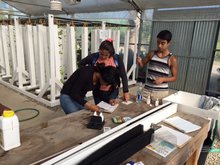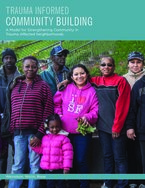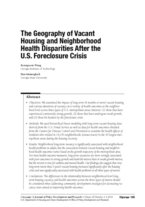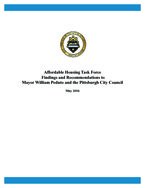0
Publication
Community:
Dec 5, 2018
The Tax Cuts and Jobs Act of 2017 provides a new incentive—centered around the deferral, reduction, and elimination of capital gains taxes—to spur private investments in low-income areas designated by states as Opportunity Zones. This provision is based heavily on the Investing in Opportunity Act (S. 1639) introduced by Senator Cory Booker (D-NJ) and Senator Tim Scott (R-SC). Given the significant interest among investors, it is possible that this new tax incentive could attract hundreds of billions of dollars in private capital, making this one of the largest economic development initiatives in U.S. history.
Authored by: Bruce Katz and Ken Gross
Topics: Community development, Funding, Legislation & Policy, Mobility, Place-based
 Shared by Mica O'Brien
Shared by Mica O'Brien
Mica O'Brien posted a
on Dec 5, 2018
The Tax Cuts and Jobs Act of 2017 provides a new incentive—centered around the deferral, reduction, and elimination of capital gains taxes—to spur private investments in low-income areas designated by states as Opportunity Zones.
0
Interactive
Community:
Nov 29, 2018
With political divisions on the rise and global cooperation imperiled, city officials worldwide are stepping up to lead, solving local problems while sharing solutions and innovations across borders. Making cities such as New York, Pittsburgh, and Los Angeles inclusive, safe, and sustainable is vital to the future of the United States—and the globe. Driven by the need to act locally while thinking globally, a growing number of metro areas are adapting the Sustainable Development Goals (SDGs) as a blueprint for progress.
Authored by: The Brookings Institution
Topics: Community development, Housing, Partnerships, Place-based, Sustainability
 Shared by Mica O'Brien
Shared by Mica O'Brien
Mica O'Brien posted a
on Dec 3, 2018
The Brookings Institution
With political divisions on the rise and global cooperation imperiled, city officials worldwide are stepping up to lead, solving local problems while sharing solutions and innovations across borders.
0
News Article
Community:
Nov 30, 2018
The city and county of Durham, GoTriangle and the Durham Housing Authority are committed to enhancing opportunities for existing low-income families as well as to increasing the production of affordable housing. The light-rail project is critical to the success of these goals, and the success of these goals is critical to the light-rail project.
Authored by: Anthony Scott and John Tallmadge for The Herald Sun
Topics: Community development, Funding, Housing, Legislation & Policy, Low-income, Partnerships, South, Stability, Transportation
 Shared by Mica O'Brien
Shared by Mica O'Brien
Mica O'Brien posted a
on Dec 3, 2018
Anthony Scott and John Tallmadge for The Herald Sun
The city and county of Durham, GoTriangle and the Durham Housing Authority are committed to enhancing opportunities for existing low-income families as well as to increasing the production of affordable housing.
0
Interactive
Community:
Nov 14, 2018
After decades of sprawl and suburban dominance, U.S. cities are experiencing rebounding populations, growing employment, and new public and private sector investments in places that are walkable, transit-oriented, and support diverse people and amenities. But we know that the benefits of these trends are not equally distributed, presenting an urgent opportunity for local and regional leaders to advance place-led development that produces better economic outcomes for more people in more places.
To help deliver on that imperative, the Metropolitan Policy Program at Brookings launched the Anne T. and Robert M. Bass Center for Transformative Placemaking (“Bass Center”) with an event on Wednesday, November 14. In collaboration with Project for Public Spaces (PPS) and the National Main Street Center (NMSC), the Bass Center will inspire public, private, and civic sector leaders to make transformative place investments that generate widespread social and economic benefits. Brookings President John Allen, Bass Center Director and Senior Fellow Jennifer Vey, special guest speaker Carol Coletta, and a distinguished panel of experts discussed how market and demographic trends are driving new demands for placemaking that benefit more people and places.
Authored by: The Brookings Institution
Topics: Community development, Housing, Partnerships, Place-based, Safety, Stability
 Shared by Mica O'Brien
Shared by Mica O'Brien
Mica O'Brien posted a
on Nov 19, 2018
The Brookings Institution
After decades of sprawl and suburban dominance, U.S. cities are experiencing rebounding populations, growing employment, and new public and private sector investments in places that are walkable, transit-oriented, and support diverse people and amenities.
0
News Article
Community:
Nov 2, 2018
Public health officials have known for decades that where you live greatly influences how long you can live. Residents who live in neighborhoods free of violence with good housing and schools and with close access to quality medical care, food and parks live longer than those who don’t. Now a recently released report — called the United States Small-Area Life Expectancy Estimates Project, or USALEEP — shows in obvious, color-coded terms the range and proximity of that disparity.
Authored by: Christian Hill for The Register-Guard
Topics: Community development, Health, Low-income, Pacific Northwest, Place-based, Research
 Shared by Mica O'Brien
Shared by Mica O'Brien
Mica O'Brien posted a
on Nov 8, 2018
Christian Hill for The Register-Guard
Public health officials have known for decades that where you live greatly influences how long you can live. Residents who live in neighborhoods free of violence with good housing and schools and with close access to quality medical care, food and parks live longer than those who don’t.
0
News Article
Community:
Sep 24, 2018
The Housing Authority of the County of Los Angeles (Calif.) developed an innovative community garden to provide access to affordable and fresh food as well as skills training and job opportunities.
Authored by: Ashanti Wright for Journal of Housing & Community Development
Topics: Community development, Food insecurity, Green, Health, Housing, Low-income, Nutrition, Place-based, Sustainability, Youth
 Shared by Mica O'Brien
Shared by Mica O'Brien
Mica O'Brien posted a
on Oct 30, 2018
Ashanti Wright for Journal of Housing & Community Development
The Housing Authority of the County of Los Angeles (Calif.) developed an innovative community garden to provide access to affordable and fresh food as well as skills training and job opportunities.
0
Publication
Community:
Jan 1, 2018
More than 50 years after the passage of the Fair Housing Act, what would it take to meaningfully reduce residential segregation and/or to mitigate its negative consequences in the United States? In this volume, leading academics, practitioners, and policymakers grapple with this question, examining different aspects of the complex and deeply rooted problem of residential segregation and proposing concrete steps that could achieve meaningful change withing the next ten to fifteen years.
Authored by: Joint Center for Housing Studies of Harvard University
Topics: Community development, Legislation & Policy, Mobility, Place-based, Racial inequalities, Research
 Shared by Mica O'Brien
Shared by Mica O'Brien
Mica O'Brien posted a
on Oct 25, 2018
Joint Center for Housing Studies of Harvard University
More than 50 years after the passage of the Fair Housing Act, what would it take to meaningfully reduce residential segregation and/or to mitigate its negative consequences in the United States?
0
Interactive
Community:
Oct 24, 2018
The Opportunity Zone Fund Directory is a list of current Opportunity Zone funding opportunities compiled by the National Coalition of State Housing Agencies staff. This resource provides descriptions and contact information for publicly-announced funds that have been formed for the purpose of attracting investment in Opportunity Zones.
Authored by: National Coalition of State Housing Agencies
Topics: Community development, Legislation & Policy, Place-based
 Shared by Mica O'Brien
Shared by Mica O'Brien
Mica O'Brien posted a
on Oct 25, 2018
National Coalition of State Housing Agencies
The Opportunity Zone Fund Directory is a list of current Opportunity Zone funding opportunities compiled by the National Coalition of State Housing Agencies staff.
0
Report
Community:
Oct 24, 2018
CLPHA’s Housing Is Initiative is engaged in a number of cross-sector activities focused on developing partnerships, facilitating a community of practice, resource development, promoting best practices, online collaboration, policy and advocacy, and training and education. Read about recent activities in this Fall Update.
Authored by:
Topics: Child welfare, CLPHA, Community development, Cost effectiveness, Data sharing, Early childhood, Education, Family engagement, Funding, Health, Homelessness, Housing, Low-income, Medicaid / Medicare, Mental health, Partnerships, Place-based, Post-secondary, Research, Stability, Substance abuse, Workforce development, Youth
 Shared by Mica O'Brien
Shared by Mica O'Brien
Mica O'Brien posted a
on Oct 24, 2018
CLPHA’s Housing Is Initiative is engaged in a number of cross-sector activities focused on developing partnerships, facilitating a community of practice, resource development, promoting best practices, online collaboration, policy and advocacy, and training and education.
0
News Article
Community:
Oct 9, 2018
Sweet Water Foundation transformed four blocks in Englewood to cultivate community and help build skills, resources, and opportunities for residents.
Authored by: MacArthur Foundation
Topics: Community development, Family engagement, Food insecurity, Green, Health, Low-income, Midwest, Nutrition, Partnerships, Place-based, Sustainability, Youth
 Shared by Mica O'Brien
Shared by Mica O'Brien
Mica O'Brien posted a
on Oct 24, 2018
Sweet Water Foundation transformed four blocks in Englewood to cultivate community and help build skills, resources, and opportunities for residents.
0
Publication
Community:
Sep 1, 2018
This guide aims to provide resources and advice from the experiences of those in the NNIP network and other related organizations on developing a strong data governance program and protecting the security of confidential data.
Authored by: Leah Hendey, Amanda Gold, and Kathryn L.S. Pettit for National Neighborhood Indicators Partnership
Topics: Community development, Data sharing, Partnerships
 Shared by Mica O'Brien
Shared by Mica O'Brien
Mica O'Brien posted a
on Oct 10, 2018
Leah Hendey, Amanda Gold, and Kathryn L.S. Pettit for National Neighborhood Indicators Partnership
This guide aims to provide resources and advice from the experiences of those in the NNIP network and other related organizations on developing a strong data governance program and protecting the security of confidential data.
0
Podcast
Community:
Sep 12, 2018
Opportunity Zones have the potential to make a huge economic impact on disinvested communities across the country. Host Justin Milner speaks with researchers Brett Theodos and Brady Meixell on how this brand-new economic development initiative works, and how we’ll know if it’s truly successful.
Authored by: Urban Institute's Critical Value Podcast
Topics: Community development, Low-income, Mobility, Youth
 Shared by Mica O'Brien
Shared by Mica O'Brien
Mica O'Brien posted a
on Oct 10, 2018
Urban Institute's Critical Value Podcast
Opportunity Zones have the potential to make a huge economic impact on disinvested communities across the country. Host Justin Milner speaks with researchers Brett Theodos and Brady Meixell on how this brand-new economic development initiative works, and how we’ll know if it’s truly successful.
0
Case study
Community:
Sep 25, 2018
Practitioners working on community safety have increasingly incorporated creative placemaking techniques into their work. Creative placemaking refers to the ways in which arts and culture change how people use the places they share.
Authored by: Mark Treskon for Urban Institute
Topics: Community development, Criminal justice, Low-income, Out-of-school time, Partnerships, Place-based
 Shared by Mica O'Brien
Shared by Mica O'Brien
Mica O'Brien posted a
on Oct 10, 2018
Mark Treskon for Urban Institute
Practitioners working on community safety have increasingly incorporated creative placemaking techniques into their work. Creative placemaking refers to the ways in which arts and culture change how people use the places they share.
0
News Article
Community:
Oct 8, 2018
A strategy for community problem-solving does an extraordinary job at restoring our social fabric.
Authored by: David Brooks for The New York Times
Topics: Community development, Education, Partnerships, Place-based, Youth
 Shared by Mica O'Brien
Shared by Mica O'Brien
Mica O'Brien posted a
on Oct 10, 2018
David Brooks for The New York Times
A strategy for community problem-solving does an extraordinary job at restoring our social fabric.
0
News Article
Community:
Oct 3, 2018
For years, Dallas has poured millions of federal dollars into affordable housing, to little effect. But in May, the City Council unanimously passed a new comprehensive housing policy, a first for the city. The goal is to build 20,000 new homes — but only in select, pre-approved neighborhoods deemed ripe for revitalization.
Authored by: Teresa Wiltz for Stateline
Topics: Community development, Housing, Legislation & Policy, Low-income, Mobility, Racial inequalities, South
 Shared by Mica O'Brien
Shared by Mica O'Brien
Mica O'Brien posted a
on Oct 4, 2018
Teresa Wiltz for Stateline
For years, Dallas has poured millions of federal dollars into affordable housing, to little effect. But in May, the City Council unanimously passed a new comprehensive housing policy, a first for the city.
0
Research
Community:
Oct 4, 2018
Housing providers and counselors in urban, suburban, and rural areas can help refugees and resettlement agencies navigate challenging rental markets, understand the evidence about how housing and neighborhoods matter, and prepare for long-term success as a renter or owner.
Authored by: Brianne Casey, Kimberly Burrowes, and Maya Brennan for Urban Institute
Topics: Community development, Housing, Immigrants, Research, Stability
 Shared by Mica O'Brien
Shared by Mica O'Brien
Mica O'Brien posted a
on Oct 4, 2018
Brianne Casey, Kimberly Burrowes, and Maya Brennan for Urban Institute
Housing providers and counselors in urban, suburban, and rural areas can help refugees and resettlement agencies navigate challenging rental markets, understand the evidence about how housing and neighborhoods matter, and prepare for long-term success as a renter or owner.
0
News Article
Community:
Oct 1, 2018
Some places lift children out of poverty. Others trap them there. Now cities are trying to do something about the difference.
Authored by: Emily Badger and Quoctrung Bui for The New York Times
Topics: Child welfare, CLPHA, Community development, Criminal justice, Housing, Low-income, Metrics, Mobility, Racial inequalities, Research, Stability, Youth
 Shared by Mica O'Brien
Shared by Mica O'Brien
Mica O'Brien posted a
on Oct 1, 2018
Emily Badger and Quoctrung Bui for The New York Times
Some places lift children out of poverty. Others trap them there. Now cities are trying to do something about the difference.
1
Publication
Community:
May 25, 2017
Neighborhoods are constantly changing as residents come and go, businesses open and close, and properties go up or come down. No place is the same for long. When community changes are widespread or stark, the conversation shifts from change to “gentrification,” the definition of which is often subject to debate. At its heart, gentrification happens when a low-income area that has experienced disinvestment attracts new economic investments and higher-income residents. But the benefits of these changes can be overshadowed by the perpetuation of disadvantage.
Authored by: How Housing Matters for The Urban Institute
Topics: Community development, Housing, Low-income, Mobility, Racial inequalities
 Shared by Mica O'Brien
Shared by Mica O'Brien
Mica O'Brien posted a
on Sep 27, 2018
How Housing Matters for The Urban Institute
Neighborhoods are constantly changing as residents come and go, businesses open and close, and properties go up or come down. No place is the same for long.
0
Research
Community:
Sep 19, 2018
Many social issues stem from a history of unstable, unaffordable, and poor-quality housing. Research shows that housing is the first rung on the ladder to economic opportunity for individuals and that a person’s access to opportunity is intrinsically linked with that of the community at large. As the gap between rents and incomes widens, it is critical that professionals in fields outside housing—including health, education, and economic development, among others—understand its central importance.
Authored by: Veronica Gaitan for Urban Institute
Topics: Community development, Education, Health, Housing, Low-income, Metrics, Partnerships, Research
 Shared by Mica O'Brien
Shared by Mica O'Brien
Mica O'Brien posted a
on Sep 20, 2018
Veronica Gaitan for Urban Institute
Many social issues stem from a history of unstable, unaffordable, and poor-quality housing. Research shows that housing is the first rung on the ladder to economic opportunity for individuals and that a person’s access to opportunity is intrinsically linked with that of the community at large.
1
News Article
Community:
Aug 19, 2018
A body of evidence points to a link between living in areas of concentrated poverty and health.
Authored by: Paul Chisholm for NPR
Topics: Child welfare, Community development, Health, Housing, Low-income, Medicaid / Medicare, Metrics, Partnerships, Racial inequalities, Safety
 Shared by Housing Is
Shared by Housing Is
Housing Is posted a
on Aug 20, 2018
A body of evidence points to a link between living in areas of concentrated poverty and health.
0
Publication
Community:
Aug 9, 2018
Trauma is a set of normal human responses to stressful and threatening experiences (National Center for PTSD, 2007). Low-income and public housing residents may experience cumulative trauma resulting from daily stressors of violence and concentrated poverty, as well as historic and structural conditions of racism and disenfranchisement. We present a model of Trauma Informed Community Building (TICB) that addresses the challenges trauma poses to traditional community building strategies. TICB strategies de-escalate chaos and stress, build social cohesion and foster community resiliency over time.
Authored by:
Topics: Community development, Housing, Low-income, Mental health, Racial inequalities
 Shared by Housing Is
Shared by Housing Is
Housing Is posted a
on Aug 9, 2018
Trauma is a set of normal human responses to stressful and threatening experiences (National Center for PTSD, 2007).
0
Case study
Community:
Aug 9, 2018
The Vita Health & Wellness District is a one-mile corridor in Stamford, Connecticut, that has positioned itself as a “health-themed neighborhood,” offering mixed-income housing, health care services, community farming, early childhood education programming, and supportive services to residents. Led by the city’s public housing authority Charter Oak Communities and Stamford Hospital, this collaboration of city agencies and community-based organizations has focused on building physical and social capacity in a distressed neighborhood, with an emphasis on leveraging collective investments to yield a positive impact on neighborhood health and well-being.
Authored by:
Topics: Community development, Education, Food insecurity, Funding, Health, Housing, Nutrition, Partnerships
 Shared by Housing Is
Shared by Housing Is
Housing Is posted a
on Aug 9, 2018
The Vita Health & Wellness District is a one-mile corridor in Stamford, Connecticut, that has positioned itself as a “health-themed neighborhood,” offering mixed-income housing, health care services, community farming, early childhood education programming, and supportive services to residents.
1
Research
Community:
Aug 1, 2018
We examined the impact of long-term (6 months or more) vacant housing and various durations of vacancy on a variety of health outcomes at the neighborhood level across three types of U.S. metropolitan areas (metros): (1) those that have experienced consistently strong growth, (2) those that have undergone weak growth, and (3) those hit hardest by the foreclosure crisis
Authored by:
Topics: Asset building, Asthma, Community development, Health, Housing, Low-income, Mental health, Metrics, Research, Safety, Transportation
 Shared by Housing Is
Shared by Housing Is
Housing Is posted a
on Aug 1, 2018
We examined the impact of long-term (6 months or more) vacant housing and various durations of vacancy on a variety of health outcomes at the neighborhood level across three types of U.S.
0
Research
Community:
Jul 24, 2018
Although public-private partnerships (PPPs) have attracted practitioner and academic interest over the last two decades, there has been no attempt to integrate the general and health management literature to provide a holistic view of PPPs in healthcare delivery. This study analyzes over 1,400 publications from a wide range of disciplines over a 20-year time period. It synthesizes formerly dispersed research perspectives into a comprehensive multi-dimensional framework of public-private partnerships, and in so doing, provides new directions for further research and practice.
Authored by:
Topics: Community development, Funding, Metrics, Partnerships, Research
 Shared by Housing Is
Shared by Housing Is
Housing Is posted a
on Jul 24, 2018
Although public-private partnerships (PPPs) have attracted practitioner and academic interest over the last two decades, there has been no attempt to integrate the general and health management literature to provide a holistic view of PPPs in healthcare delivery.
0
Report
Community:
Jul 24, 2018
The Affordable Housing Task Force began with an assumption that there was a compelling need to address the changing landscape of housing affordability in Pittsburgh. Through research, discussion, and community and stakeholder engagement, the Task Force has arrived at recommendations that respond to both the assumption and the realities of affordable housing in the city.
Authored by:
Topics: Community development, Funding, Housing, Low-income, Partnerships, Seniors
 Shared by Housing Is
Shared by Housing Is
Housing Is posted a
on Jul 24, 2018
The Affordable Housing Task Force began with an assumption that there was a compelling need to address the changing landscape of housing affordability in Pittsburgh.







 Shared by Housing Is
on Aug 20, 2018
Shared by Housing Is
on Aug 20, 2018

 Shared by Housing Is
on Aug 9, 2018
Shared by Housing Is
on Aug 9, 2018
 Shared by Housing Is
on Aug 9, 2018
Shared by Housing Is
on Aug 9, 2018
 Shared by Housing Is
on Aug 1, 2018
Shared by Housing Is
on Aug 1, 2018
 Shared by Housing Is
on Jul 24, 2018
Shared by Housing Is
on Jul 24, 2018
 Shared by Housing Is
on Jul 24, 2018
Shared by Housing Is
on Jul 24, 2018









